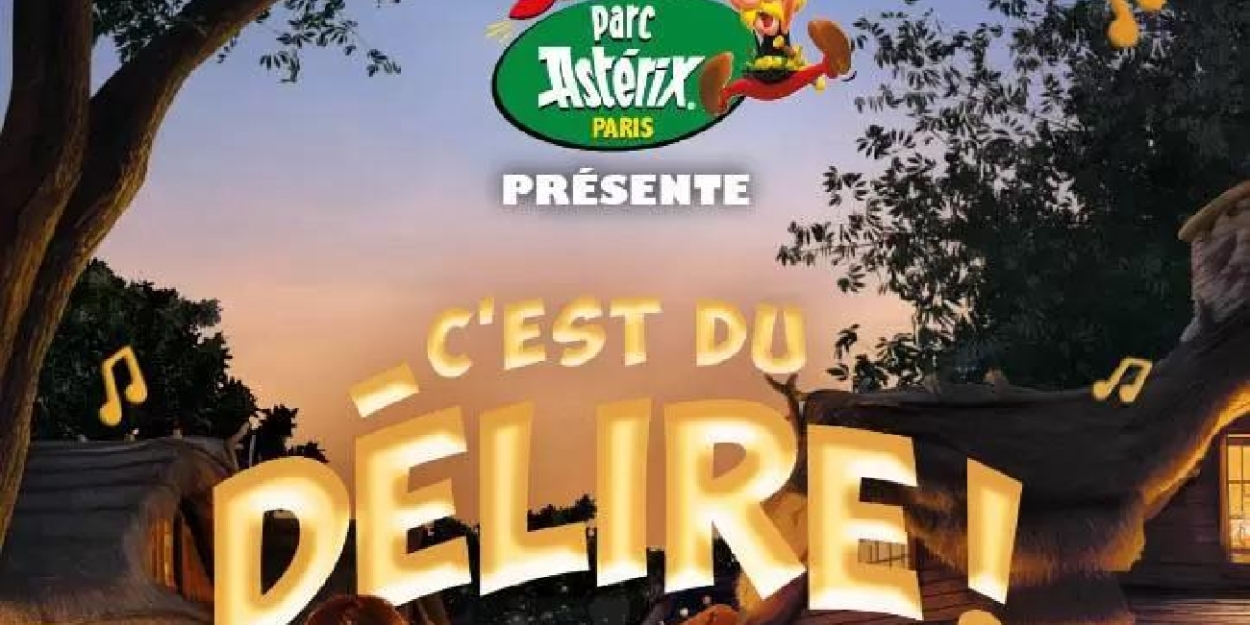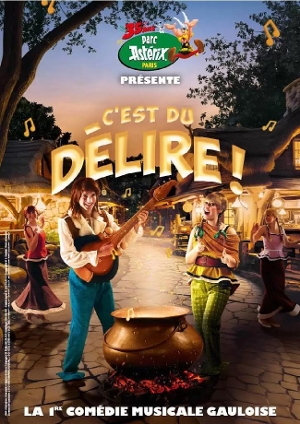Interview: Julien Salvia & Ludovic-Alexandre Vidal of IT'S MADNESS! at Parc Astérix
An original musical comedy C’est du délire !, or It’s Madness!, billed as “the first Gallic musical comedy”, began performances on March 30th.


On the heels of the mini-musicals found at Disneyland Paris comes the first ever musical theater style live entertainment from its main European competitor in France (and Europe) Parc Astérix, inspired by the stories of the famous comic book series Astérix by René Goscinny and Albert Uderzo. This theme park offers a variety of attractions and shows based on historical periods from the world of Astérix and his friends, whimsically celebrating Gaulish culture with over 50 attractions and shows, including roller coasters, water rides, and live performances. This year, as part of its 35th anniversary celebration, an original musical comedy C’est du délire !, or It’s Madness!, billed as “the first Gallic musical comedy”, began performances on March 30th.
Composer and director Julien Salvia and librettists Ludovic-Alexandre Vidal, who previously penned the family musicals Rapunzel at Espace Pierre Cardin (2014), The Little Match Girl at Théâtre du Palais Royal (2015), Tom Sawyer (2018), and Around the World in 80 Days (2020), the latter two at Mogador, have made the right decision not to musicalize the comic books' protagonists Astérix and Obélix themselves but to create original characters for this self-reflexive mini-musical mixing Gallic history and mythology with Disney and Broadway allusions, much in the same way the Tony-nominated Something Rotten (2015) put Shakespeare and musical comedy together.
We join the new characters Groupidupianix, who longs to become the greatest bard of all time, and Sérotonine, who dreams of becoming the first female druid, as they decide, with everything opposing them, to team up in carrying out some grand schemes (or shenanigans). Eleven talented actor-singers on stage perform original songs, ranging in style from pop rock to Broadway, rap and funk, that recount the farcical adventures of our two heroes. With costumes by Isabelle Ledit, choreography by Yun Seon Hong, and sets by Julien Bertevas and Jean-François Preti, ten scenes follow one another as props come and go on the revolving stage, with the added pleasure of puppetry by Carole Allemand in the form of two tap-dancing boars.
After three years in development, It’s Madness!, “the first Gallic musical comedy”, came to life on the stage of the 600-seat Panoramix Theater at Parc Astérix on March 30th for five 30-minute shows a day.
I had the pleasure to interview composer Julien and Ludovic-Alexandre ("Ludo") about their fun-filled, feel-good musical. Here’s what they had to say:
-
Why did you choose to not to include the actual characters of Astérix and Obélix in your musical?
Ludo: When Hervé Bruneau (the show's producer) asked us to respond to the call for a bid to write Parc Astérix's first musical, we thought about whether we should make Astérix and Obélix sing. We only had 30 minutes to get the public to accept the musical theatre convention, so we thought it might be easier to have a character who wanted to become a bard as the hero. This would help us get the audience to accept why the character would sing more quickly.
Julien: We also discussed with Hervé the casting. Can you imagine, casting eight Astérixs and eight Obélixs with their very particular morphologies? Could have been kinda tricky. We wanted to avoid masked characters, and wanted to have only bare faced characters with live musical theatre performers on stage.
Ludo: That's why we came up with the idea of sending Astérix, Obélix and Gétafix (or Panoramix) on a mission.
Julien: It also allowed us to do something interesting: a parallel adventure to the Astérix storylines. What happens when Astérix and Obélix are away on a mission and not in the village? We decided to make a sort of spinoff of Astérix's adventures with C'est du Délire!.
-
What are your main references for self-reflexive, even self-parodying, musicals?
Julien: We wanted to have different musical styles, depending on the situations and the character. So, while the titular musical number "C'est du Délire!" refers to the great classic musical numbers of the golden age, as Mel Brooks does in The Producers, we also have more pop/rock numbers like Groupidupianix's I want song, "Je voudrais qu'on m'entende" ("I Wanna Be Heard"), or the showstopper "J'veux du tonus" ("I Want Tone"), sung by the Romans. And to stay in the parody universe of Astérix, we of course wanted to introduce parodies of some famous musicals, like Singin' In The Rain or West Side Story, for instance.
Ludo: Even though C'est du Délire! is not directly a self-reflexive musical, since none of the characters are actually putting on a musical show, some such musicals were indeed influences, since many of them include parodies of famous musical theatre shows. Something Rotten, for instance, was a reference for us for these aspects.
-
Were you inspired by Disney musicals, other than in first song paying tribute to "Bonjour", the opening number of Beauty and the Beast?
Julien: For the first number, to introduce the fact that there would be many musical parodies in the show, we decided to write a song which would start like a pastiche of the song "Belle" from Beauty and the Beast. And while in Belle's village everyone gossips behind her back, here in the Gallic village, everything is more straightforward; everyone hits each other and is happy this way.
Ludo: There's also a parody of Frozen when Assurancetourix seems to sing "Let It Go" with his famous off-key singing, and Barramine (Groupidupianix's mother) knocks him out on the spot. These are the only two parodies of Disney, which was one of the styles of musical theater we wanted to parody at times (just like Golden Age musicals or pop/rock musicals).
-
How did you come up with the concept of the magical potion that make the characters sing and dance?
Julien : Right from the start, Ludo wondered how he could make the comic book characters sing when they never sing or dance in the original work.
Naturally, he decided that the main character (Groupidupianix) should be a singer and dream of becoming the greatest bard of all time. This gave him a good reason to sing ?. But for the other characters it was a different matter. To justify this, he came up with the idea of creating a magic potion (a staple of the Astérix universe) that would turn whoever drank it into a real musical theater creature, which would lead to some pretty hilarious situations.
-
How did you manage to find a way to convey the distinct Astérix vernacular into musical theater?
Ludo: By rereading all the comics and watching the films based on them again, we were able to understand the DNA of Astérix as well as possible, and to draw from it a spirit and language that were both modern and respectful of the original work. We also had a number of meetings with the series' publishers Editions Albert René, with whom we discussed what was and wasn't possible in the world of the little Gaul.
Julien: Asterix is also a strong visual universe. As a director, I wanted to bring the comics to the stage in warm, saturated colours. We worked with experts in the world of Asterix for the sets, costumes, and props. The aim was to create a film-like experience on stage, with real actors in a cartoon setting.
-
Are you planning to expand the show into a full-fledged musical one day?
Ludo: It would be great to do a full-length musical of this show. There's so much we don't have time to tell in this 30-minute version that we'd love to tell.
Julien: Indeed, I think there's so much more to do. At the moment, people are enjoying the show, and many have said to us, "it's too short!", so I'm sure they'd be delighted to extend the experience by attending a 90-minute show.
Comments

Videos

